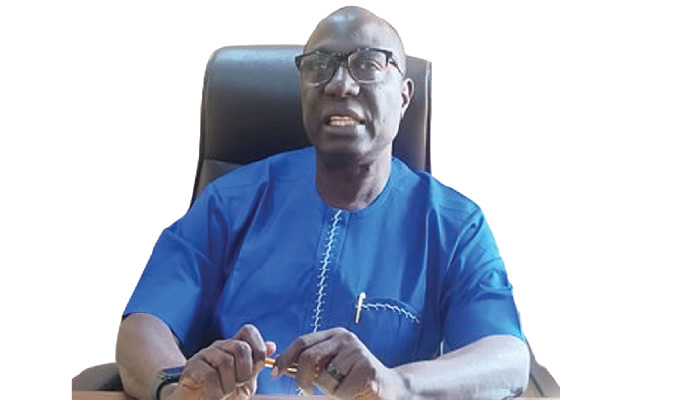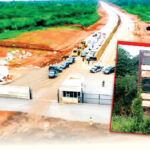
Taraba State Commissioner for Transportation Development, Yakubu Yakubu, tells JUSTIN TYOPUUSU what the state government is doing to create safer waterways for residents
What is the road map for transport development in Taraba state?
Let me start with inter-transport which I view as the one that affects the common man. It is very difficult now to run government enterprises. If the government invests money to put buses on the road, we’ll be running at a loss. The then Danbaba (Suntai) administration tried it but it didn’t work. So, what we’re doing now is that we are talking to some banks. Last week, we had a meeting with a commercial bank to consider whether they will provide buses for us to run the four routes that we have earmarked. We divided Jalingo into four routes.
The first one will run from Kona to Sabon Gari, the second will run from Airport Junction, the third from Mile Six to ATC, and the fourth from the School of Nursing down to the Palace Way and terminate at this first roundabout at ATC. Because of the free education policy of the governor, we earmarked new bus stops and these bus stops are a few meters from all the public schools in Jalingo.
How useful will the buses be to residents?
We intend that when we get the buses, at 7 am or 7:30 am, any child in uniform will be taken to school by the buses for free. Then from 12:30 to 1:30 pm, drivers are mandated to drop off any child seen in uniform walking along the road at the closest bus stops to their house. So by the time we do the roads, we expect that inter-transport will have been taken care of so that tricycles can only drive from areas like Mayo Gwoi and Mile Six. They will be given numbers. The ones driving around Mile Six will be given a specific number because of security so that tricycles from Mile Six will not go to Mayo Gwoi and commit a crime there. Even the unions that will man the area will not allow tricycle riders to do any business outside their designated areas. They (tricycle riders) will only be mandated to pick up from inner streets and discharge on the express or main road for the busses to pick and that’s what we’ll do for inter-city transportation.
Secondly, we’re still talking to individuals that can provide taxis or small vehicles that can run through the day like from morning to the next morning. They be using an app so you can book from the comfort of your house. And this will kick off anytime next year, we are still in talks with the ministry of digital economy, you know they are saddled with the responsibility of computerizing the ministries. So we are talking with them to help us develop an app that will make this system work seamlessly. Then we should be able to streamline the activities of these tricycles.
Is there a time limit for motorists to operate in Jalingo?
You know tricycles stop operations by 8 pm, so after that time, nightlife in Jalingo is dead. So, any tricycle that operates after that time could commit a crime and go free. However, when we introduce the small taxis, I think it will be very good for the people of Jalingo to do business at any time – from morning to the next morning.
Is the government doing anything to make the airport more viable?
In the area of air transport, we are trying to expand our airport. You can see that the aircraft coming to Jalingo come for one or two weeks and stop. It’s not that other aircraft are not willing to come but our landing area or runway is not good for them to land, especially for new aircraft. However, we hope and pray that we’ll be able to generate funds next year to expand the runway so that we can attract more aircraft and our new routes will be Lagos-Abuja, Abuja-Jalingo, and Jalingo-Kano. We are still considering whether we will add Gombe but it depends on the passengers the airlines can get because they won’t be doing business for nothing.
Some officials from the Nigeria Civil Aviation Authority and Air Force visited the airport for inspection. Was it part of the expansion drive?
Yes, it is part of the expansion drive. You know, before this administration (came in), the airport was shut down, and some conditions were given for it to be re-opened; as I speak, we are on provisional approval of six months. So, these people coming, they are just trying to help us meet the demand of the agency so that they will give us back our operational license. That’s why they came. It’s because of their good relationship with the governor and they have promised to help. And for them to help, they will have to have a detailed analysis of what is happening.
It was learnt that the Taraba State Government bought at least two jets, one of which was involved in a crash and the other said to be in Abuja. Is the government not considering putting them to commercial use to generate revenue for the state?
The aircraft are there. I, the permanent secretary in my ministry, and a director went to see them. We saw them physically. They are still parked and they have been there for a very long time. An aircraft is not like a vehicle that you have to bring a mechanic to service if it’s parked for one year. The longer you park an aircraft, it takes you time to rehabilitate it, and do the test flight first, because you will not be allowed to carry passengers. So, it’s going to take a longer time for us and all this is capital intensive. So we must engage a private airline to move our people, and then we will raise some funds to service our two aircraft. Before the administration winds down, I promise that with the way we are moving now, we will surely meet this target. By the time we have a brand new runway and landing areas, more aircraft will come. The more they come, the more money we will make to fix our own. That, I believe, we will surely do.
Water is an important means of transportation in Taraba State, especially for residents in rural areas. What measure is the state government putting in place to make the waterways safer?
Water transportation has been silenced for some time now in Taraba. I know we used to have ferries for a very long time, but they have stopped now. Now we inherited a system that has not been working, such that the presence of the government is not felt so we are starting afresh. We have a very big market for water transportation and even in small markets, most of our people depend on water transportation. For example, from Akwana, you can move to Ibi and Tella, and from Tella to a village where fish is sold. Then you can proceed to Karim.
If the previous government was sensitive to the people, it would have enacted a proper regulatory law. It would have bought facilities, it would have provided technical advice on how people can be moved from one point to another. So, that is what we are doing now. We have captured that in our budget and by the grace of God, we will not have the repeat of what happened. We intend to go to Lokoja (in Kogi State) to meet with the waterways authority so that they can come. We wanted to meet them earlier but unfortunately, we couldn’t. So we will do that early next year, get them to come and assess our waterways to see how they will help us in building a jetty. It’s important to get a jetty first before we get a ferry, but there are modern ferries that can carry cars across the other side. I think that’s what it will depend on now, although we think we have to improve from there.
You talked about water transport but in Kashimbila, there are only ferries coming from Cameroun, not from Taraba. Are you considering operating that international route?
Yes, we are thinking of that, but until the security situation there improves. I have been there with an engineer who took me with some of our consultants. We went through the water to the border of Cameroon but when we were about 100 meters away, they were flagging us down that we couldn’t pass there. And for you to do business across the waterways, you must have a permit, and you must involve the Federal Ministry of Foreign Affairs.
However, there is a lot of tourism potential there. Now I was discussing with the engineer and he was willing to help us only if we develop it as a tourist business in conjunction with the Cameroonian authorities.
We are also considering whether we will talk to the TY Foundation to help us along that line because the airport there in Kashimbila was built by the TY Foundation and I think they are thinking along that line. So, we are still waiting to see their plan, and what they intend to do with the structures they are building around that area, then we can approach them to help us there.
The Taraba State Transportation Corporation seems to have been defunct. Don’t you think the government is losing a revenue source as a result of that?
Yes, the TSTC will soon come back to the limelight. We are presently getting some offers. We have got one from a bank. They are offering us as many buses as we would like, and they want to be involved in the revenue that will come in; they will manage the accounts.
The Ministry of Transport through the TSTC will manage the park. But they (the bank) are ready to give us buses for inter-state transportation, buses that will operate in Jos, Lagos, and Kaduna as they used. But we still have the private ones because they are our last resort when we are not able to move. They help us at least to keep the name. If you hear the name, TSTC, it’s a very good brand and they’ve been helping us. Even if we can procure our own through the bank, they will still be there just to help us move the name or have enough buses that can move from and come back to Taraba. The company handling the palliative market will develop the park and fix it, but it depends on when they are through with the market.
Some state governments are considering the use of compressed natural gas buses for public transportation. Is the government considering doing the same to ease the movement of people within Taraba?
We are still looking at getting some CNG buses. Now, we can’t just bring in what we cannot maintain and fuel. So, we must have a station where CNG will be there for them to fill. Apart from that, if we’re going to cover all the local government areas, that means we will need 16 CNG stations, one in each local government area.
So, it’s not only about procuring the buses. If you leave them like that, they will end up developing faults and we would lose them. We are identifying the local governments that we will start with. We must start somewhere and then study it, and develop it so that it can go around the 16 local government areas. So, if I tell you today that Taraba will get CNG buses, it’s only to park (them) because if you drive and the gas that you brought the buses with gets finished, we’ll leave them there. So, we want to identify the stations that we can use. For instance, here in Jalingo, we might probably use the NNPC Mega (filling station).
Why is the government not taking immediate steps to fix the transportation sector of the state? Or are there challenges?
The challenge is just one and it’s always funding. We don’t have money. I pity my governor. He walks all around from country to country trying to attract investment. We have to invest, so you must develop something that people will like to buy into.
Let me give you an example with the airport. There’s a lot of money there. Only the terminal building can fetch more than N300m a year. It’s just simple: get the aircraft to come irregularly. There are people, banks, and institutions that will buy advert points, and you know how much they pay for adverts. So, we must develop the airport and do the runway and when we have the traffic, we will make our money. So the only challenge we have is money and will always be money.
The state government announced a ban on night travel on waterways after 20 bodies were recovered from a boat accident that occurred along the Mayo-Renewo-Karim Lamido Waterway in River Benue on October 28. Is that ban still in place?
That ban is still in force and we are doing it in collaboration with the National Inland Waterways Authority, and we also have staff members of NIWA on the ground to make sure that there’s no night travel. That said, you know humans as they can be; some still went ahead and embarked on a night journey and that’s what brought about another boat accident in Ibi en route to Onitsha. They took off in the night and the accident happened around 12 am. Normally, they go as far as the Niger Delta from Taraba. As the water dries up, they follow it to where they can get more volume of water to continue their fishing activities.
From your investigation, what was the cause of the accident in the Karim Lamido LGA?
The cause of the accident was the barricade on the waterways. It was placed there to trap fish from entering the bigger river. And because they (passengers) were travelling at night, they didn’t see it. When you ask them why they don’t use flashlights at night, they say it confuses them at night. They prefer to travel without light. We warned them also against overloading, and as we speak, we don’t know the number of people that were onboard or the number of deaths. We can only talk about the number of bodies we recovered.
How many were recovered?
The number is still 20.
Does the government enforce the use of live jackets to reduce the risks in water transportation?
Boat owners don’t have jackets but the government has made some efforts by providing some. However, passengers will give you many reasons they can’t wear the jackets; they claim they were born there and have been using that means of transportation all the while. Sometimes, we have problems with them but we decided that there should be a law enforcing the use of life jackets and we are also using traditional institutions to enforce the use of life jackets.
How would you describe the standard of the boats used by the operators and is there a way of regulating that?
We left that to the National Inland Waterways Authority. What we are doing now is insisting on the use of functional boats because, for them, it’s first come, first served. Whichever boat you meet in the queue is the one that will carry passengers without minding the condition of the boat. However, now, we insist that before you bring your boat, it has to be in good working condition.




